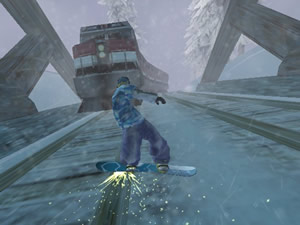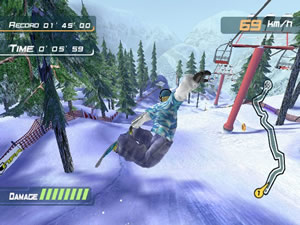Snow big deal.
It might be good to be the king, but
it ain’t so hot when you’re dethroned. Few games know this as intimately as 1080
Snowboarding, the once proud ruler of last generation’s snowboarding games
that has been pretty much off the radar for a good five years now. In that time,
EA’s SSX series has ushered in a brand
new way to tackle the slopes, including two excellent entries for the Gamecube
in SSX Tricky and SSX
3. How would the one-time sovereign respond to this new upstart?
Not so well, it turns out. Despite a lengthy development period and a built-in
fan base, 1080 Avalanche is merely an average snowboarding
game that can’t remotely compete with the current king of the mountain.
I
think Nintendo took the phrase “console race” a little too literally, having
released four in-house racing games over the past few months in F-Zero
GX, Kirby Air Ride, Mario
Kart: Double Dash and now 1080. That’s right – it might
look like an extreme sports game, but thanks to an awkward, somewhat needless
trick system, 1080 is really just a racer in warm clothing.
Snowboarding is at its best when it combines speed and tricking, but 1080
Avalanche screws up the balance right from the start. You can power
up a jump with the A button, though if you hold it down too long (longer than
about two seconds) it will disengage. Once you get airborne you can pull off
a garden variety of tricks and spins, but comboing is nearly impossible. First
you have to power up the jump perfectly, then perform a trick, wait until your
character flashes, then perform another one. Since you’re not actually
snowboarding on the moon, gravity sends you plummeting back to the ground before
you can string together more than one or two moves, and there’s no manual or
anything to link jumps.
Boarders don’t cut very quickly or handle well at all, sort of leaning back and forth as they charge down the mountain. If they replaced the riders with cars, you would hardly know the difference.
The result is an archaic system that simply pales next to the likes of SSX
3 or Tony Hawk:
Underground. All you get for tricking are points and incremental boosts
to a ‘Strength’ meter, which lets you go a little faster and knock people over.
That’s it. No special moves, no extra turbo boosts, nada. The developers must
have been locked in a closet for the past three years.
At least there are plenty of ways to tackle the hill. You can play Gate Challenges (slaloms) or Time Trials to unlock boards and riders; the latter features coins to collect alongside ghost races. A Trick Attack mode includes three courses on which to bust out moves, but the unwieldy tricking makes it all but impossible to actually nab high scores.
The bulk of the game takes place in Match mode, which pits you against another
rider in a downhill sprint. It’s pretty much just about racing since you don’t
get any extras for tricking. This has some problems, the least of which is the
fact that if you bump into something and stop, you’re pretty much screwed. It’s
like slamming headfirst into a wall in Gran Turismo. You’re
out of the race.
A catch-up feature does keep things interesting, so even if you blow it once or twice, you’ll still have a shot at the finish line. But this rubber band effect only covers up the lack of a more skills-based approach like you’ll find in SSX’s tricks-for-boost system. One nice touch is the ability to recover from spills by rotating the stick around to maintain balance.
 Maintaining
Maintaining
your fickle gamer’s attention span, though, is a bit tougher. Good gamers will
complete the Match races in a few sittings, and after that it’s just about unlocking
extras. The boarders themselves are fixed – there’s no player creator or gear
here at all. Aside from new boards and outfits, what you see is what you get,
and that’s not a whole lot.
Another problem lies in the track length. Though there’s a good variety, all can be completed in under two minutes, a far, far cry from the more involving races we see in other games. While the inclusion of the various modes let you approach the tracks differently (racing through gates will lead to different lines than picking up Time Trial coins), it’s all very disjointed. There’s nothing tying these modes together, leading to a very arcadey, one-shot game.
In fact, 1080 Avalanche even doles out lives in the Match races. Lose three times and you have to start at the beginning of the circuit again, which can suck at the harder levels when winning a racer is tougher.
However, it isn’t all yellow snow here because the word “avalanche” isn’t used flippantly – you’ll actually have to outrun avalanches. Big, nasty ones, too, storming behind you, nipping at your boots while you desperately try to maintain balance and speed. These moments are the game’s best, full of frantic energy as trees collapse and boulders shoot out in front of you. The tracks feature a few shortcuts and some interesting designs as well, making for at times a fun race.
It looks pretty good too, with a steady framerate and some nice effects, especially during the craziest bits when you’re caught in the middle of a gigantic snowslide. The boarders are rather plain, but you don’t really watch them as much as the environments anyway. The sense of speed is palpable thanks to a shaking screen and speed lines as you start to haul serious tail. As a racing game, it’s not bad.
The multiplayer actually holds up well, though even a four-player split screen race suffers from the same fate as the single-player because of the lunky controls. Those of you with a few TVs, Gamecubes and copies of the game can LAN it, but it still maxes out at four competitors per race.
1080 Avalanche isn’t so much a bad game as a bland one. It
does what one might have expected it to do…if it came out three years ago. But
considering the contributions of other snowboarding games – namely SSX
– you can’t help but feel that this one is out of touch. An awkward trick design
and emphasis on speed over style keeps it from reclaiming its past glory, leaving
this ex-champ struggling in the snow.

-
Avalanche!
-
Nice looks
-
Good sense of speed
-
This is a racing game
-
Not so much a snowboarding game
-
Because the tricking is bad
-
Short
-
Not much depth







